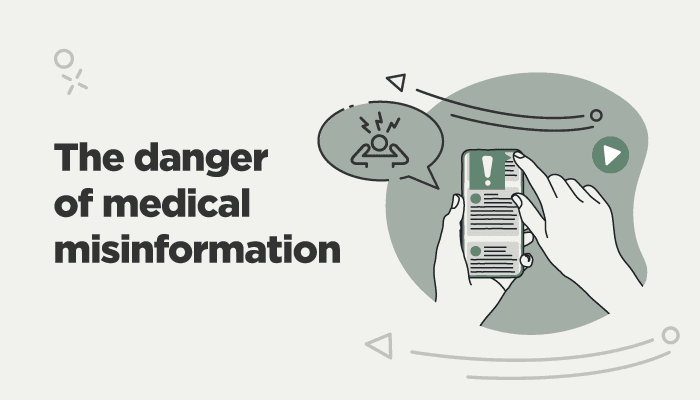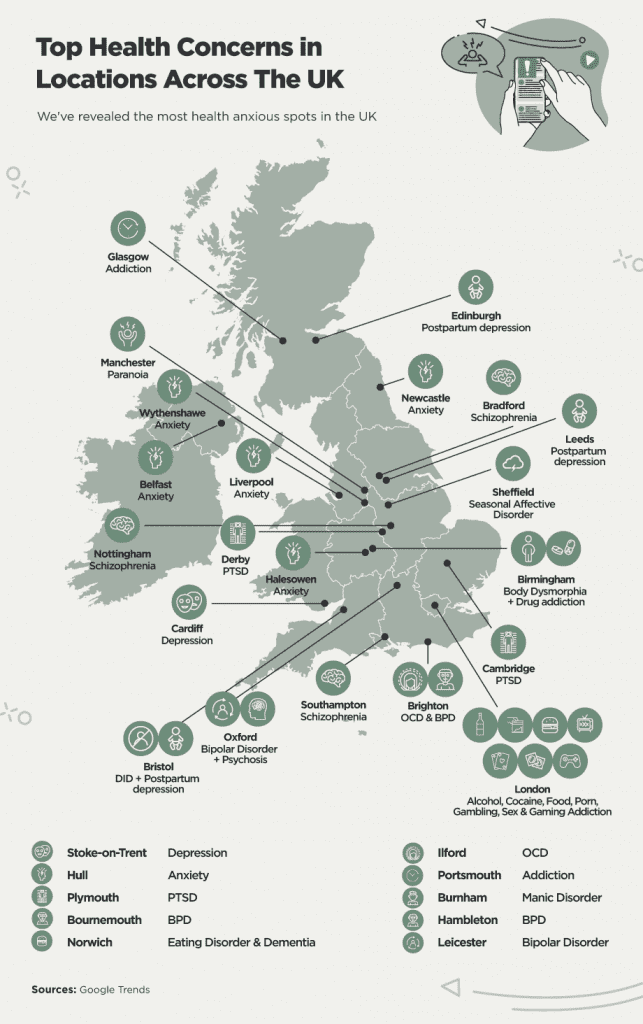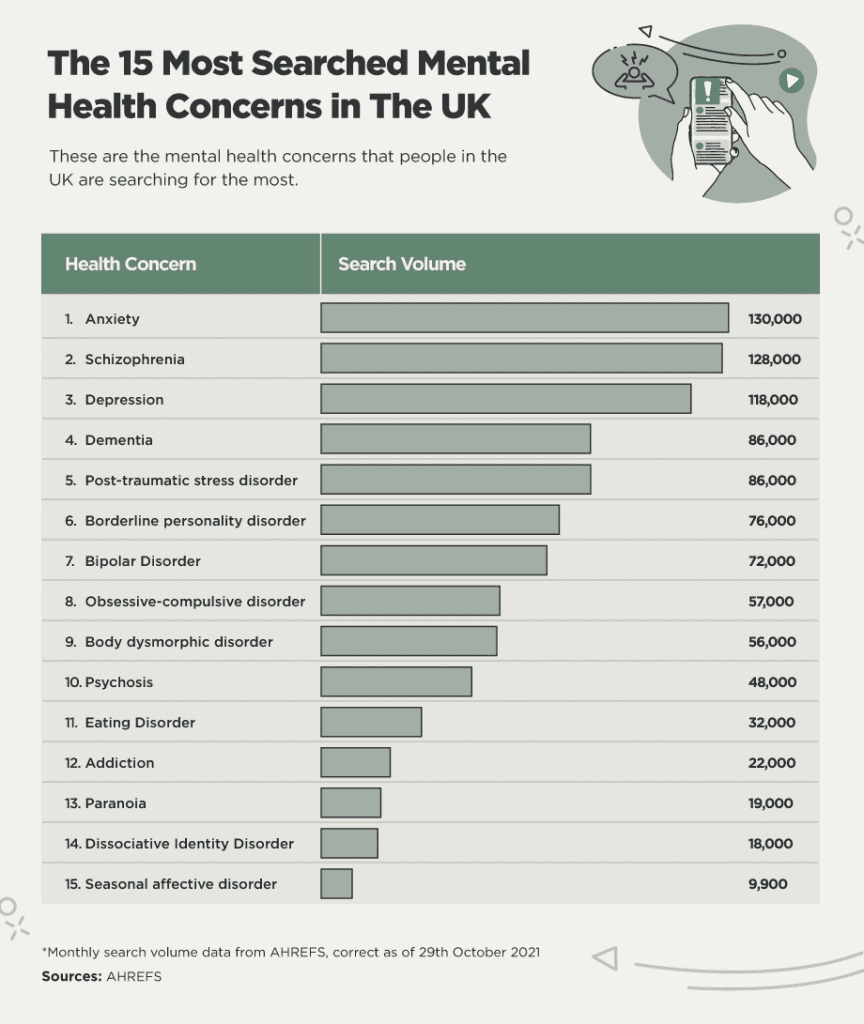
In an age of social media supremacy, coupled with hospital waiting times at their highest since August 2007, more and more people are turning to the internet for medical advice. But should you trust the information you receive on social media? And what exactly are the dangers of doing your own research?
Contents
- Introduction
- How reliable is medical information found on social media
- The most Googled addiction concerns in the UK
- Do you live in one of the UK’s most health-conscious locations?
- The UK’s most searched mental health concerns
- How reliable is medical information found on social media?
- Most searched addiction and mental health concerns
- Most health-conscious locations in the UK
To find out how (un)reliable medical information found on social media can be, our team of specialists have analysed addiction and mental health awareness posts on the video-focused social networking platform TikTok.
To uncover which addiction and mental health concerns are shaking the nation, our team of data analysts have used Google Trends data to determine the most commonly searched terms and in which locations.
How reliable is medical information found on social media?

Our team of addiction treatment professionals watched the ten most viewed videos on TikTok about addiction, and reviewed the advice given against four factors. Scoring ten points for each factor; an accurate and reliable social media medical advice video must contain 100% factually correct information, come from a qualified and trusted creator, be suitable for its audience and advise the viewer to speak to a doctor.
Unbelievably not a single one of the top ten TikTok videos on medical advice contained any advice to speak to a doctor. Meaning that each of the videos scored zero out of ten for this factor, immediately casting doubt over the general reliability of medical information found on social media.
In fact one of the videos titled “The negative effects of alcohol” was found to be 0% accurate, as it scored zero out of ten in all four factors. Few videos fared much better with “Facts about alcoholics” and “How to control your video game addiction” only scoring nine out of forty overall each. With 44,600 views, the highly watched “How to rewire the brain after pornography addiction” scored even worse, with a meagre overall score of eight out of forty.
“The potential signs of an eating disorder” is the most viewed addiction video on the platform and has received an incredible 11,800,000 views, but surprisingly was only found to be 62% accurate. The medical information provided in “The potential signs of an eating disorder” was 70% accurate, and it scored a perfect ten in the trusted creator category, making it one of the better performing medical advice videos on TikTok. The video was also found to be suitable for its audience with a score of eight out of ten, but was ultimately let down by not advising its viewers to speak to a doctor.
By comparing the total scores of the top ten TikTok medical information videos against each other, the average reliability of medical information on TikTok is a measly 37% (149 out of 400), indicating that seeking out your medical advice on social media sites like TikTok is even less safe than simply flipping a coin.
If you are experiencing addiction-like symptoms and feel that you need urgent medical advice or information, there are plenty of other, safer ways to seek help than on social media. The best possible thing that you can do is go directly to your doctor, but if for whatever reason that is not possible at the time, then the next best option is to dial ‘111’ to receive assured information and advice from the NHS.
Founder & Chief Executive Martin Preston:
“While the internet is a great tool to have, social media is not the best place to visit for accurate medical information, since anyone can post anything there without being properly qualified or their information being properly fact-checked.
If you are seeking medical information or advice online, make sure you are using the websites of trusted medical institutions such as the official NHS website. For the vast majority of medical concerns there will be an established, trustworthy charitable organisation set up with a professional website that will answer most questions. Examples of these sites are Macmillan, which focuses on cancer and Mind, which focuses on mental health. If you have concerns about addiction, then Delamere is a great source of online information and advice.”
The most Googled addiction concerns in the UK

Sex addiction
Addiction and mental health specialist, Dr Catherine Carney explains that “sex addiction is a behavioural and intimacy disorder, characterised by obsession and compulsion. It is one of the most overlooked and misunderstood addictions.
“Sex addiction, also known as Compulsive Sexual Behaviour Disorder (CSDB) is a recognised mental health disorder that can manifest in many forms, including excessive masturbation, pornography, obsessive fetishes or seeking sex with strangers or multiple partners. Whatever the activity or behaviour that is linked to sex addiction, the driving force is the person’s distinct lack of control.
“Sex is a part of our basic human nature, but in sex addiction, it is taken to the extreme and can overpower every aspect of a person’s life”.
Research reveals that the term ‘sex addiction’ had a monthly online search volume of 8,000 in the UK, making it the most searched health concern in the country. By comparison, that is roughly four times the number of online searches for the terms ‘alcohol addiction’ (2,000 monthly searches) and ‘drug addiction’ (2,100 monthly searches), demonstrating just how concerningly common sex addiction is in modern-day Britain.
It remains unclear as to why there has been a surge in sex addiction, but some therapists consider the increasingly easier accessibility of online pornography and anonymous cyber-sex to be accountable for the UK’s increasing concerns surrounding sex addiction.
Gambling addiction
Research shows that 6,100 people in Britain are Googling the term ‘gambling addiction’ each month. It is possible that the increase in the number of concerns surrounding gambling addiction may coincide with the rise in popularity of smartphones, providing easier access to gambling on mobile sites and apps.
Dr Catherine Carney states that “gambling addiction is a medically recognised disorder of the brain. It is more severe than simply an inability to gamble responsibly, much like substance addiction is more severe than an inability to manage their intake.”
“Gambling addiction is a type of disorder that has progressed to the point that the brain’s pleasure or reward system has been conditioned to prioritise gambling above every other aspect of life. A gambling addict will lose the power of choice when gambling, as the addiction hijacks the individual’s brain.
“Someone suffering from gambling addiction will take increasingly greater risks with their gambling and become so preoccupied with gambling that they will allow it to take over their social life, personal relationships, finances and career.
“The destructive nature of a gambling addict can be as frustrating and painful for those close to the individual struggling with the addiction as it is for the individual themselves. In many cases, when gambling addiction is left untreated, it can cause the sufferer to completely self-destruct and even contemplate the idea of suicide”.
Do you live in one of the UK’s most health-conscious locations?

All over the country, we each have our own specific concerns about our health, but in which locations are certain health concerns the most prevalent. Travelling the map reveals that Anxiety, Schizophrenia, Postpartum Depression and PTSD are amongst the biggest health concerns in the UK.
Anxiety, which research reveals is one of the most common mental health concerns in the country, is of particular concern in Liverpool, Newcastle-upon-Tyne, Belfast, Halesowen and Hull. The term ‘anxiety’ refers to a feeling of unease or worry that can vary in intensity depending on the individual dealing with it. While everyone is capable of experiencing feelings of anxiety to some extent, Anxiety disorder is a specific mental health condition that causes a person to respond to even the most ordinary of situations with fear and dread.
In the cities of Derby, Plymouth and Cambridge, PTSD is the biggest health concern. Post-traumatic Stress Disorder is an anxiety disorder caused by experiencing highly distressing and frightening events. Someone suffering from PTSD may experience intensely disturbing thoughts and flashbacks that last long after their traumatic event has occurred. PTSD can be especially common in military personnel, with some studies suggesting an increase in PTSD amongst veterans who saw active combat during the last ten years.
Postpartum Depression is the biggest health concern in the cities of Edinburgh, Leeds and Bristol. Postpartum Depression is a depressive condition that some women can experience after giving birth. It is very closely related to Postnatal Depression, which may be a more familiar term to some, however, Postpartum Depression refers specifically to issues affecting the mother. This form of depression typically occurs around 4 weeks after childbirth, but has been known to occur up to several months after childbirth.
The UK cities in which Schizophrenia is the biggest health concern are Bradford, Nottingham and Southampton. Schizophrenia is a long-term mental health condition where the person suffering from it may trick themselves into thinking that they are seeing, hearing or believing things that are not real.
London and Glasgow are the two cities where Addiction is the biggest health concern. Residents of London are concerned about many forms of addiction including alcohol, cocaine, food, porn, sex, gambling and gaming addiction.
The UK’s most searched mental health concerns

With so many of us in the UK now owning smartphones and laptops, it is easier than ever to clue ourselves up on any mental health concerns. Research reveals that Anxiety and Schizophrenia are the UK’s top two most searched mental health concerns, with Anxiety receiving 130,000 monthly searches and Schizophrenia receiving 128,000 monthly searches.
It is unsurprising that Anxiety is the UK’s most searched mental health concern, since many people can experience the feeling of anxiety without actually suffering from an actual disorder. It is understandably difficult for people to distinguish between the general and the genuine feeling, which may account for the high volume of online searches. Since anxiety is so common, there may also be a higher number of people wanting to educate themselves on the subject, who are turning to Google for answers.
Another heavily searched mental health concern in the UK is Depression with 118,000 monthly searches. Like with Anxiety, almost all of us can experience the feeling of being depressed from time to time without actually suffering from depression to the point where we need to be diagnosed. The medically recognised Clinical Depression refers to an overwhelming feeling of sadness or low self-esteem that can last for huge lengths of time, depending on the individual suffering from the condition.
Other widely searched mental concerns are Dementia and Post-Traumatic Stress Disorder, which tie for fourth place with an average of 86,000 monthly online searches. While PTSD is usually triggered by the occurrence of a traumatic incident, Dementia tends to be caused by an abnormal build-up of proteins called ‘amyloid’ and ‘tau’. These proteins essentially function like plaque, around and in between the brain cells. Dementia is something that is often thought of as affecting people later in life, but most diagnosis cases occur in people aged between 45 and 65.
Some mental health concerns that are searched less frequently are Seasonal Affective Disorder (SAD) which places at the bottom of this list with 9,900 monthly searches, as well as Dissociative Identity Disorder (DID) which ranks fourteenth with 18,000 monthly searches, and Paranoia which is of slightly greater concern in the UK with 19,000 monthly searches.

“While search engines like Google can serve as great tools for clueing ourselves up on the basics of mental health concerns, it is useful to remember only to use them as a starting-off point. When scouring the internet for medical information, it is important not to fall into the trap of self-diagnosis. While Google can provide us with some accurate information, terminology and definitions surrounding various mental health concerns, remind yourself that only a medical professional like a doctor is qualified to provide you with a diagnosis.”
Founder & Chief Executive Martin Preston
Methodology:
How reliable is medical information found on social media?
We analysed the top 10 most viewed addiction videos on the social media platform TikTok based on four-point criteria; Does this page contain 100% correct information, Does this TikTok advise the reader to speak to their doctor, Is the creator qualified and trusted and Is it suitable for the lay audience. Each video was rewarded a score out of 10 points for each section, to make a total score out of 40.
Most searched addiction and mental health concerns
Taking a seed list of common mental health and addiction concerns, we used Google Trends data to determine which have the highest monthly search volume in the UK.
Most health-conscious locations in the UK
Taking a seed list of locations across the UK, we used Google search data to determine where the most common mental health and addiction-related queries were searched the most.






